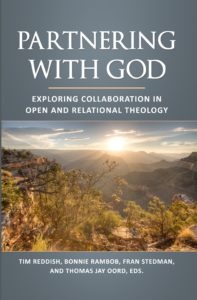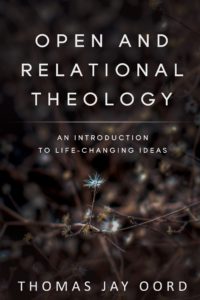Partnering with God
I’m happy to announce the publication of a new book, Partnering with God: Collaboration in Open and Relational Theology!
The title itself will strike some readers as audacious. After all, who can really claim to “partner with God”?!
Partnering with God answers that question by claiming collaboration with the divine is a real possibility!
Seventy-seven essayists explore from practical, philosophical, biblical, poetic, personal perspectives what it means to partner with God. The book includes questions and is suitable for sparking group discussions. The essays vary and proposals provoke new insights.
This book breaks new ground!
What “Partnering with God” DOES NOT Mean
As one of the editors of this book, we wanted to be clear about what we don’t mean by “partnering with God.”
We don’t mean that creatures are equal to their Creator. We differ from God in many ways, so equality with deity is not something we think possible.
We also don’t mean partnership implies that we can function without God’s creative influence, empowerment, or love. We’re not entirely independent beings who exist without help from God and others. In fact, it’s in God that we live and move and have our being. Without God, we can do nothing.
By “partnering,” we mean that our choices, actions, and agency play a role alongside God’s activity in the world. We can cooperate (or not) with our Creator. We’re potential collaborators, conspirators, and co-creators. To join with God means we contribute to the unfolding of existence.
Partnering with God is our calling and part of what it means to be made in God’s image.
Diversity
The essays in Partnering with God explore diverse ways of understanding collaboration.
Some essays are theoretical, exploring theological, philosophical, biblical, or scientific dimensions of partnership. Others are personal, practical, even poetic. Some essayists explore partnership applied to daily life.
We think this diversity is a strength. The essays cover more topics than a book of uniform essays could. What unites their diversity is the common cause of pondering partnership with the divine.
What is Open and Relational Theology?
These writings align with a particular theological perspective called “open and relational theology.” This broad umbrella includes many ideas, movements, and thinkers. But open and relational thinkers share at least two commitments:
1. The “relational” in open and relational theology stands for the idea that God is affected or influenced by creatures and creation. We make a difference to the divine. This is reflected in how our prayers influence God, how we treat each other and creation, our cooperation for salvation, and more. This means, among other things, our actions ultimately matter. In short, God is relational.
2. The “open” in open and relational theology points to the ultimacy of time’s flow. God and creation face an open and yet to be determined future. In fact, there is no “future,” if by that word we mean a state of affairs already fully settled and knowable. Instead, we and God move forward in time and choose among possibilities, options, and opportunities. The future is open.
Open and relational thinkers explore other ideas too, such as God’s love, creaturely agency and freedom, a relational world, personal and social action, God’s presence and power, and so on.
To dive deeper into what Open and Relational Theology entails, check out my book, Open and Relational Theology: An Introduction to Life-Changing Ideas (SacraSage, 2021). And check out the resources available on the website of the Center for Open and Relational Theology (c4ort.com).



Comments